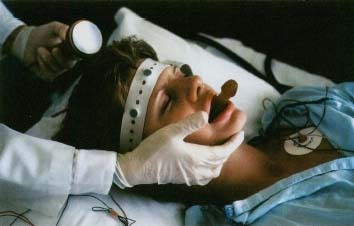 I came across a quite horrific piece of reporting today when I discovered that Electro Convulsive Therapy is still being used and worse it is being used on children as young as 4 years old.
I came across a quite horrific piece of reporting today when I discovered that Electro Convulsive Therapy is still being used and worse it is being used on children as young as 4 years old.This brutal treatment has been in place since the 1930s and although it has been refined a little over the decades (with sedation to prevent the pain) it still seems analogous sticking a long needle into the brain, stirring it around and hoping for the best.
It is used by psychiatrists as a last resort when all other drug and talk based therapies have been exhausted, at least that's what I thought. This blog post seems to indicate that far from being a last resort it is being used routinely in Australia on young children.
ECT causes permanent brain damage, it destroys memory and cognition skills, are they really saying that this is the best way of dealing with a child?
It may be useful; to remember that doctors are fallible too and it's not that long ago they would recommend certain brands of cigarettes as being 'good for the chest'. In other words they get things wrong.
I struggle to believe that drugs or ECT are the only treatment options open to these children; what is their diet like, what is their family life like who is caring for them in the fullest sense of the word?
There really has to be a much better way than this.




I agree that very careful consideration should be given before a child OR an adult receives ECT treatment. I disagree, and research and clinical experience DOES NOT support your statement:"ECT causes permanent brain damage, it destroys memory and cognition skills". To make such an unsubstantiated statement is to help the BIAS and stigma against ECT flourish, thus denying many people who may benefit, access to evaluation for the treatment. Scaring people with such misinformation keeps them from even considering a very effective and safe treatment. Not only do people with mental illness have to deal with the stigma of the illness itself, they have to deal with the horror of others reactions to the treatment when the opt for it. Only when others see the patient's improvement do they ask "Are you on a new medicine?.....what are you doing? ...you look great"!, and find out that ECT helped the patient become well again (if the pt isn't too ashamed to admit that they had ECT). So stop the bashing with just bad information.
ReplyDeleteFrom this comment I am not sure whether the poster is from the medical community, a previous ECT patient or someone who has experience through a third party.
ReplyDeleteThe main drift of the story that I linked to was the use of ECT on children as young as 4 years old. Something I still take issue with.
I did describe ECT as 'brutal' but in the linked article was the following quote;
Neurologist Sidney Sament describes the process:
"After a few sessions of ECT, the symptoms are those of moderate cerebral contusions ... Electroconvulsive therapy in effect may be defined as a controlled type of brain damage produced by electrical means ...
More evidence is cited on this link http://www.ect.org/effects/2-18-2003_cognitivemaint.html
And there others that readers can find through a quick Google search.
ECT may well be an effective treatment for some people but just as with drugs, it is not free of side effects.
And to return to the main point, shouldn't it be a last resort? Especially for children who have no choice about the treatment they receive.
Other links that readers may fine useful:
http://www.ect.org/effects.shtml
http://www.antipsychiatry.org/ect.htm
http://www.ect.org/shock-therapy-positive-and-negative-charges/
First of all, characterizing ECT as brutal based on the opinion of one person is inaccurate and irresponsible. I can quote many scientists, doctors, and researchers who hold a negative opinion of hypnotherapy, but I would in no way characterize hypnotherapy based on their opinion. I am not an expert on ECT, however I am an ECT professional who has seen countless people get their lives back and other actually have their lives saved with ECT.
ReplyDeleteIs ECT brutal? Absolutely not. This procedure is done under general anesthesia. The person has NO PAIN from the procedure! There is very little, if any, movement of the body. The body does not convulse. A therapeutic seizure is created in the brain which, the vast majority of the time, results in improvement or remission of the patient's symptoms.
Are there side effects? Yes, there are possible side effects including memory problems. Again in my practice of treating more than 500 patients, only one person has ever had what seems to be permanent memory loss for certain past events prior to ECT treatment. Was this a surprise to this patient? No. Part of the informed consent process is information regarding the possibility of memory impairment. The patient and the family weigh this risk against the possibility of getting well and the severity of the depression. The "evidence" you present is a study of 11 people! ELEVEN! I do not believe that can be called "evidence"....
Regarding the "quick Google Search" , I am sure I could find the good and bad for any treatment by doing this. The negative stigma that ECT carries from years of misuse and the abuse of the mentally ill, has lead to its current negative press. Is hypnotherapy without such bias?
I am asking for an open mind when it comes to ECT. I could go on about its refinement, due diligence with administration, careful selection of patients, etccc.....but the bottom line is that it is NOT the brutal treatment: it does NOT cause structural brain damage, there are possible cognitive side effects BOTH POSITIVE and NEGATIVE. When you relive depression, cognition is very often IMPROVED. Memory and concentration can and have been seen to improve after treatment.
...yes and back to the main point.. "Do You Really Want to Treat Children This Way" I do believe that it should be used as a last resort UNLESS the patient is in immediate danger of dying from their depression: those who are not eating or drinking, catatonic states, and certain acutely suicidal patients. I do not work with children so it very difficult to make this judgement, but if it is a matter of life or death, I would consider it. Seeing is believing and I have seen ECT save lives.
"ECT Relieves Sufering/ERS" has posted a balancing perspective on the use of ECT and makes some important points about its use, including the need to select patients carefully.
ReplyDeleteI think this is probably a useful point at which to close this discussion which was primarily about the use of ECT with children as young as 4 years.
As "ECT Relieves Sufering/ERS" says "I do believe that it should be used as a last resort UNLESS the patient is in immediate danger of dying from their depression", that does not appear to always be the case though.
I will bow to the poster's greater experience in this area and acknowledge that ECT may sometimes the only treatment option available, I can only hope that all those who administer the treatment are as diligent and careful as this person seems to be.